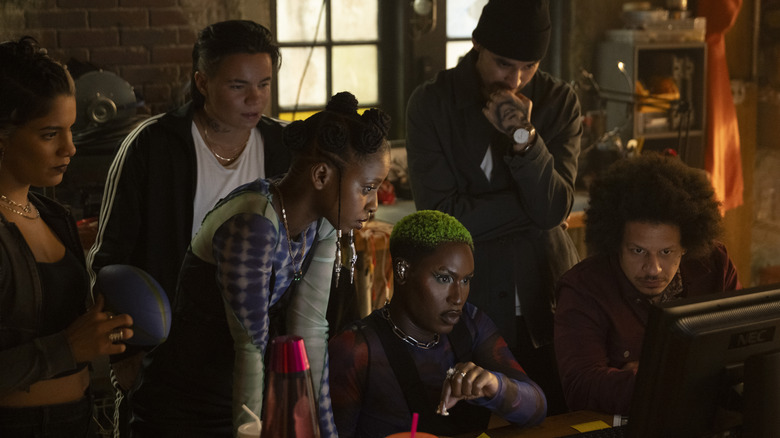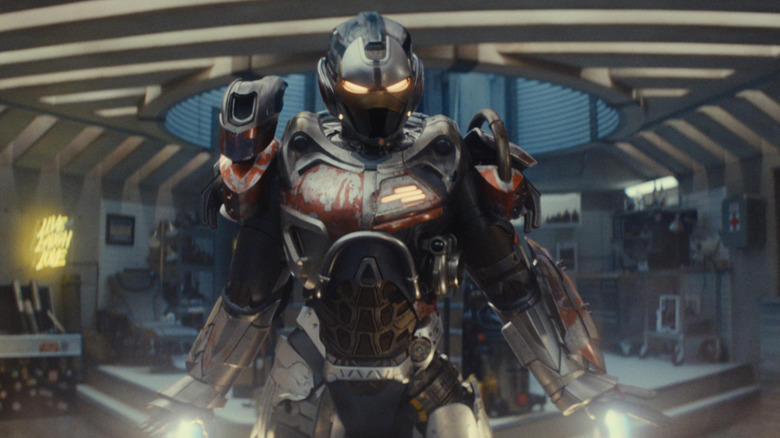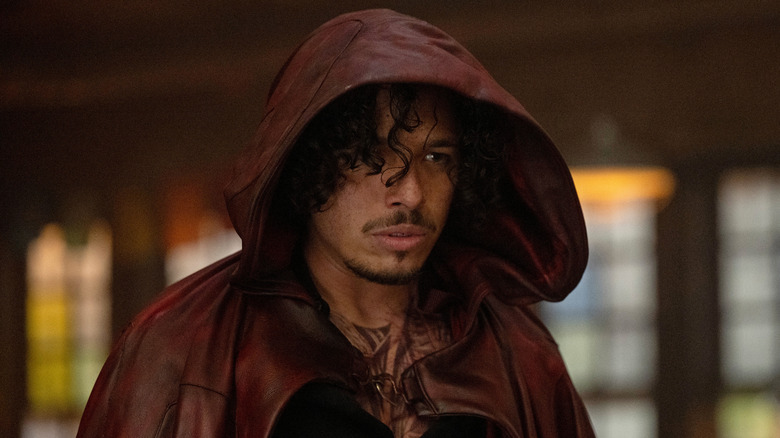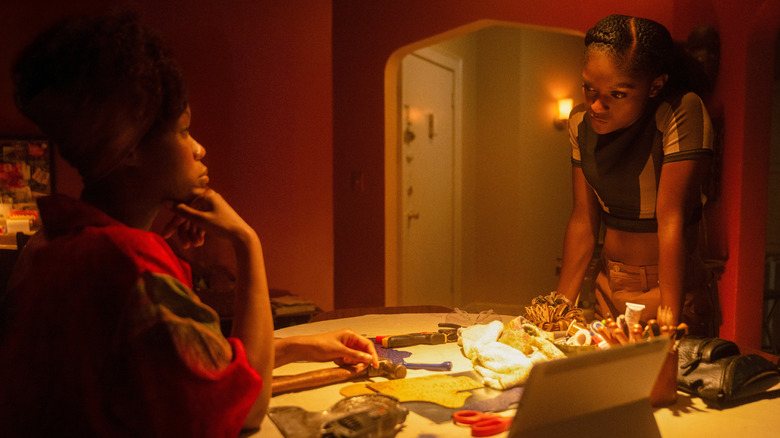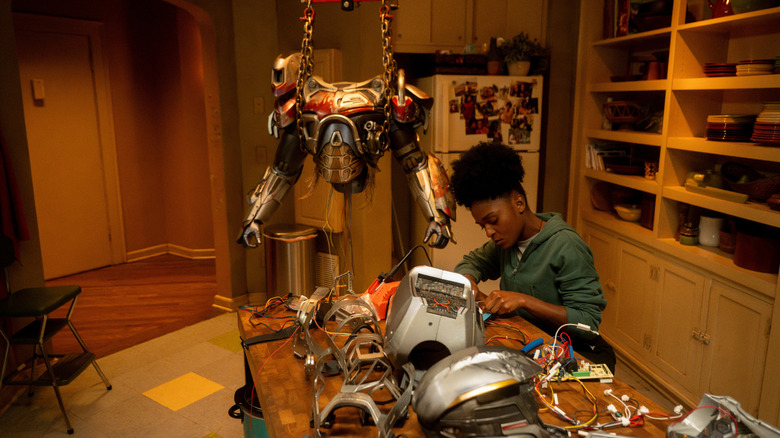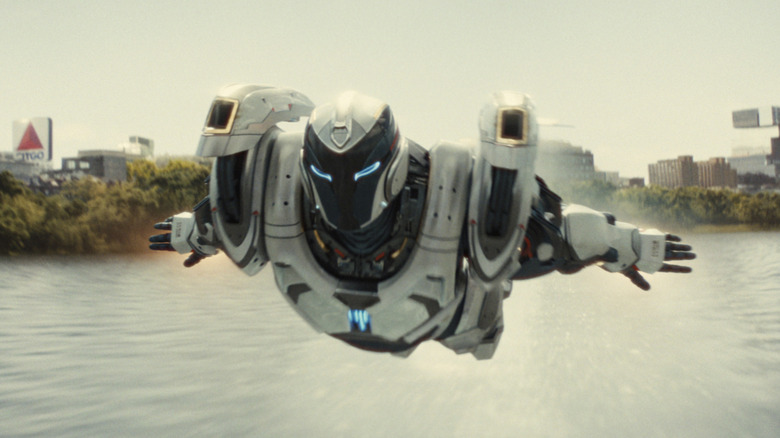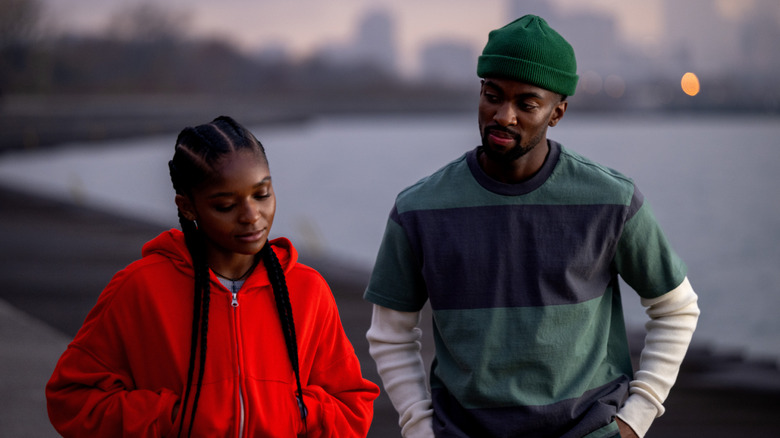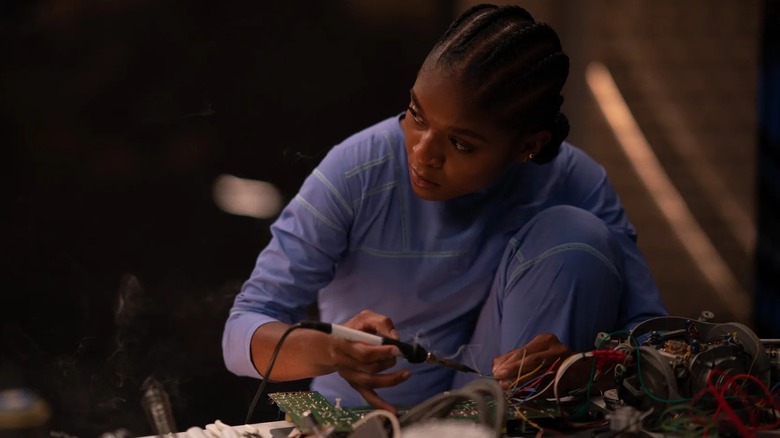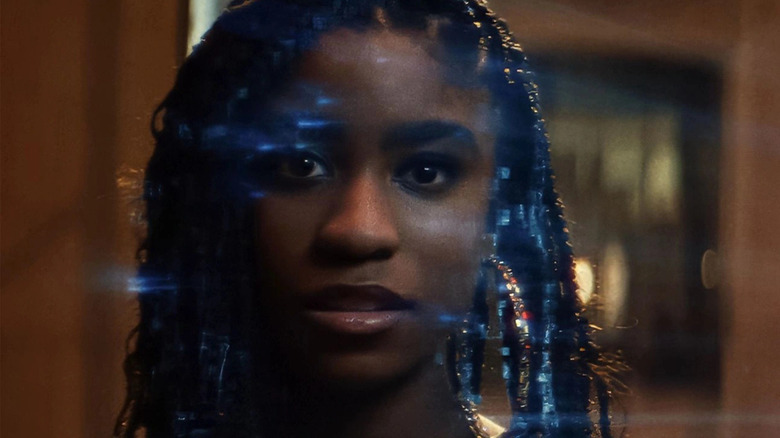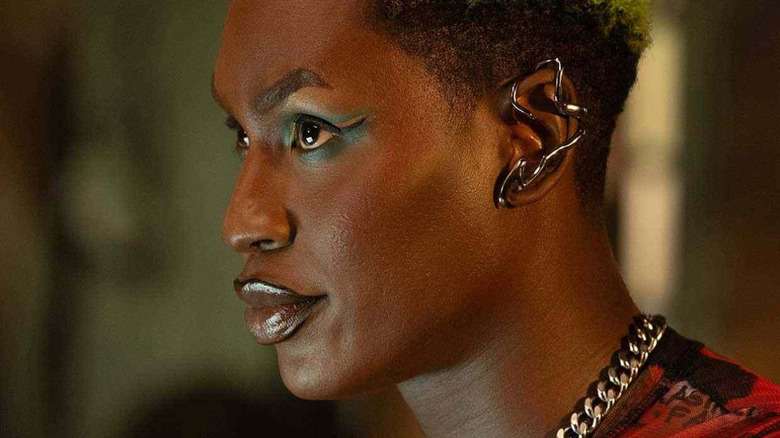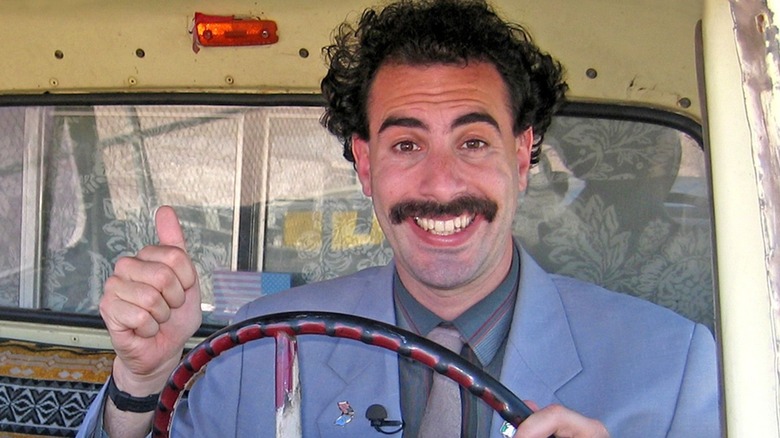5 Things That Worked In Marvel's Ironheart (And 5 That Didn't)
Contains spoilers for "Ironheart" Episodes 1-6
Just under a decade after her first comic book appearance, Riri Williams/Ironheart gets her own solo live-action TV show with "Ironheart." A direct follow-up to Dominique Thorne's version of the character introduced in "Black Panther: Wakanda Forever," "Ironheart" sees Riri Williams returning to her home of Chicago in need of cash to make all her technological ambitions come true. She decides to embark down a shady path to procure those funds that involves pulling off heists for Parker Robbins/The Hood (Anthony Ramos).
Over six episodes, "Ironheart" struggles to balance its more intimate impulses with superhero action. Neither element works nearly as well as it should, while the drab pacing of this miniseries will quickly try the patience of even the most ardent Ironheart fans. Still, that's not to say "Ironheart" is a total misfire. Throughout nearly six hours of television, there are inevitably bright spots that give the program more of a pulse.
Exploring five things that worked in "Ironheart," as well as five that very much didn't, emphasizes which talent both in front of and behind the camera left the best kind of impression with their work. On the other hand, this process also allows one to fully understand the shortcomings that keep "Ironheart" from soaring to its fullest potential. "Ironheart" is a lot more "Iron Man 2" than "Iron Man 3" in overall quality, and breaking down the show's creative high and low points helps zero in on how "Ironheart" reached that outcome.
Worked: The use of practical suit effects
It's frustrating how superfluous the armored suit supposedly driving so much of "Ironheart" is to the show's larger plot. However, when it does appear on-screen, it looks shockingly solid. This can be partially chalked up to the use of practical effects work for versions of the suit that are just standing around.
In a sea of Marvel television programs overusing CG, like "She-Hulk: Attorney at Law" and "Secret Invasion," the immediately tangible textures of Riri's masterwork are tremendously appreciated. Her brilliance is easier to understand since the armor she's created looks like something you could reach out and touch. It'd be harder to comprehend her genius if her greatest accomplishment looked like a bunch of hastily-assembled pixels sweatily emulating reality.
Better yet, the digital version of the armor looks similarly solid thanks to these practical reference points. Granted, CG-heavy scenes, like the armor's appearances during an elaborate greenhouse heist in Episode 3, benefit from dark nighttime lighting that can hide the digital seams. Still, any number of lackluster CG stunt doubles in big movies and TV shows vividly demonstrate that smoothly alternating between practical and digital effects work is not an easy task. Pulling off a solid balance between the two for the central armored suit in "Ironheart" is one of the show's greatest assets — too bad the armor doesn't show up more.
Didn't work: The Hood's tragic backstory
Another day, another post-2018 Marvel Cinematic Universe project trying and failing to recreate the Killmonger magic from "Black Panther." Michael B. Jordan's seminal, tragic villain remains a dynamite creation, but he's spawned many subpar MCU imitators, like Gorr the God Butcher (Christian Bale) in "Thor: Love and Thunder," Karli Morgenthau (Erin Kellyman) in "The Falcon and the Winter Soldier," and President Ross (Harrison Ford) in "Captain America: Brave New World."
The latest example of this "tragic" villain phenomenon is "Ironheart" baddie Parker Robbins/The Hood. Introduced as a magic-user who wants to get revenge on Chicago's 1%, Robbins' backstory is gradually doled out over the first five "Ironheart" episodes. Eventually, Robbins confronts his rich dad and rigidly shouts how, after his mom passed, his father wasn't there for him and eventually threw him out of the house.
Just the way this backstory is delivered (with flat expository dialogue and stale imagery) makes it hard to invest in Robbins. The fact that his crusade against the bourgeoisie gets awkwardly dropped in the finale further compounds how poorly defined his character is. Mostly, though, suddenly plopping down a sob story about Robbins doesn't work because of how little moral ambiguity he's been afforded. From how he's filmed to the orchestral music accompanying his presence, The Hood is a very straightforward villain, and awkwardly shoehorning in daddy issues doesn't suddenly make him lovable.
Worked: Anji White's performance
A veteran of the Chicago theatre scene, actor Anji White has previously appeared in major television productions like "The Chi" and "Fargo." However, "Ironheart" provides White her biggest platform yet as Riri Williams' mother, Ronnie. It's a role White performs exceptionally well, especially since she's playing a discernible human character navigating magic-users and fully conscious A.I. tech.
Rather than defining Ronnie as a stereotypical mother character in a genre show, White plays Ronnie as an inquisitive soul game for anything, albeit one who also wants to protect her daughter. A high point of "Ironheart" rests on White's acting chops as an A.I. recreation of Riri's deceased friend Natalie (Lyric Ross) suddenly appears in front of Ronnie. Despite Riri insisting this program stay hidden, Natalie makes her presence known to the only other occupant of the apartment.
Initially shocked, Ronnie is later shown just relaxing on the couch and conversing with the digital Natalie. It's an amusing subversion of expectations, as Ronnie has learned to stop worrying and love the knowledgeable A.I. in front of her. White imbues Ronnie with realistic line deliveries and physical behavior in this scene, making for an amusing contrast to the bizarre scenario she's stumbled into. Throughout "Ironheart," Anji White effortlessly conjures up a tangibly human aura for Ronnie that easily makes her one of the show's standout figures.
Didn't work: The drab visuals
There's no getting around the fact that "Ironheart" looks bad, even by the standards of small-screen Marvel Studios programs. The production polish of inaugural MCU shows on Disney+ like "WandaVision" and "Loki" has given way to programs with limp framing and minimally interesting camera angles. In the case of "Ironheart," directors Sam Bailey and Angela Barnes don't demonstrate much variety in their visual style throughout the six episodes. Whether Riri is navigating a tense heist or chatting in her room with A.I. Natalie, the show's visual scheme remains static.
Even brief shifts to "Joe McGillicuddy"/Ezekiel Stane's (Alden Ehrenreich) ritzier Chicago suburbs don't inspire unique imagery-based flourishes. Editing and camera during the few fight scenes, meanwhile, are tremendously uninvolving. These subpar visual tendencies especially undercut the show's more grandiose elements. The Hood in particular never looks menacing or stylized in his screentime. Everything about the character's appearance and the way he's filmed makes him look like he wandered away from a 2007 superhero fan film.
Even the distinctive architecture and ambiance of Chicago are sanded off in "Ironheart," further depriving the show of its own visual identity. Though its titular lead was first created in 2016, "Ironheart" draws upon decades of Marvel Comics stories full of colorful drawings and costumes. Tragically, "Ironheart" as a TV show offers nothing imaginative or vivid to dazzle the eyes. Even compared to the likes of "The Falcon and the Winder Soldier" and "Secret Invasion," the visuals in "Ironheart" underwhelm.
Worked: Dara Taylor's lively score
The "Ironheart" score is composed by a total newbie to the MCU. Rather than just hiring a middling MCU score veteran like Lorne Balfe, Henry Jackman, or Ramin Djawadi, Marvel Studios brass hired Dara Taylor to create lovely orchestral tracks for the series. Previously responsible for scoring comedies like "Barb and Star Go to Vista Del Mar" and "Strays," Taylor proves adept at producing compositions the coming-of-age and action-oriented beats of "Ironheart."
While sequences like armored Riri Williams getting trapped under a car feature uninspiring visuals, Taylor's score comes through in emphasizing distinctive personality and tension. The blending of electronic influences with more traditional orchestral impulses is an especially fun way to suggest how Riri's tech-fixated activities are colliding with everyday Chicago.
Sonic dissonance is particularly interesting for Ezekiel Stane, the "Ironheart" character who (inexplicably) gets the most prominent musical themes. Whenever this guy is on-screen, Taylor's score bounces between bubbly electronic noises and zippy piano playing. It's a vivid auditory reflection of a schlubby suburbanite at internal war with his father's toxic, mechanical legacy. Tracks for the various heist sequences are also fun, particularly in how they capture the anarchic energy of the societal outcasts Riri is working with. Granted, Dara Taylor's score doesn't hold a candle to the greatest genre TV show scores, such as that of "Andor." But her commendable work often outshines the rest of "Ironheart."
Didn't work: Riri Williams and Xavier Washington's relationship
One of the most flatly written "Ironheart" plot threads is the relationship between former best pals and neighbors Riri Williams and Xavier Washington (Matthew Elam). The latter character is supposed to be the one who grounds Riri, as illustrated by the two "Star Trek"-loving pals comparing themselves to Kirk and Spock's similar dynamic. However, that rapport doesn't work because Xavier never comes across as a fleshed-out human being. On the contrary, he doesn't have much of a life beyond just being a springboard for Riri to deliver exposition to.
What are Xavier Washington's dreams? Who is he as a person? Does he have friends beyond Riri? "Ironheart" fails to flesh him out as a person or give him anything resembling a tangible personality. That alone leaves this central connection undercooked. It doesn't help that the writers fail to get specific about the nature of Riri and Xavier's relationship. There are hints (including one line from A.I. Natalie) of a romantic bond between the duo, but the scripts are too woefully bereft of sensuality to ever make that palpable. Any sense of a crackling, lively friendship, though, doesn't come through in their awkward dialogue.
Thorne and Elam also don't have exceptional chemistry together, which further hampers this crucial "Ironheart" plot point. Xavier is meant to bring out the lighter side of Riri, who always has her guard up. Instead, he's just a microcosm of the show's consistently underwhelming writing.
Worked: Any scenes with Heather and Madeleine
In "Ironheart" Episode 4, "Bad Magic," Ronnie and Riri Williams, in the wake of the latter character's turmoil and paranoia getting even worse, pay a visit to their old friends Madeleine (Cree Summer) and Heather (Tanya Christensen). The duo run one of Chicago's most beloved candy shops, but it turns out they have other, more peculiar interests as well. Turns out both of them are sorcerers who've dabbled in magic and Kamar-Taj teachings. Their expertise in these matters proves useful in helping Riri determine what's going on with the fragment of The Hood's mystical hood that she has procured.
As Madeleine and Heather explain the world of magic to Ronnie and Riri, Summer and Christensen share enjoyably lived-in banter centered on matters like Heather dropping out of Kamar-Taj or the unexpected presence of dangerous insects in their magical workspace.
So much of "Ironheart" is excessively cryptic, with both Riri and Parker Robbins keeping vital information out of reach. In contrast, Madeleine and Heather's rapport provides standalone, immediate pleasures. They're not teasing future movies, but rather engaging in amusing dialogue. It's a shame these two characters bounce off each other in only one "Ironheart" segment since they're easily the show's best duo.
Didn't work: The Natalie Washington A.I. ramficiations
Through an unexpected snafu at the end of the first episode of "Ironheart," the A.I. in the show's central armored suit manifests as NATALIE, the digital spitting of Natalie Washington, Riri Williams' deceased friend. A direct adaptation of the same character and A.I. from the "Ironheart" comics (albeit with a slightly different tragic demise for Natalie), NATALIE isn't just the equivalent to JARVIS for Riri Williams. Instead, the show constantly touches on the moral complexities of resurrecting someone via A.I. technology, especially after Xavier Washington discovers there's an A.I. that looks exactly like his dead sister.
Unfortunately, the exploration of this theme proves unsatisfying in "Ironheart." The impulse to indulge in very traditional dramatic beats for NATALIE (namely her "death" at the end of Episode 5, "Karma's a Glitch") undercuts attempts to imbue her existence with dark underpinnings. Rather than presenting a nuanced creation that can be both moving and eerie, "Ironheart" keeps defaulting to predictable story turns and easy morality for any material involving NATALIE.
The result is a subplot that leaves a lot of thematic potential on the table while also introducing creepier elements to NATALIE that the show's tone can't properly handle. It's a weird, uncomfortable mess (particularly with the modern connotation of "A.I.") that visibly demonstrates how the thematic ambitions of "Ironheart" far exceed the grasp of the show's writers.
Worked: Shea Coulee's Slug and The Hood's crew
Easily the highlight of "Ironheart" Episode 1 is the fun, easygoing rapport between the various criminals, hackers, and fighters working for Parker Robbins. That includes master hacker Slug (Shea Couleé), siblings Jeri (Zoe Terakes) and Roz Blood (Shakira Barrera), and the outspoken Clown (Sonia Denis). Given how vaguely defined so many "Ironheart" relationships are, the warmth between these individuals is a lot of fun. Plus, Shea Couleé injects Slug with a delightfully pronounced and confident aura.
Those qualities are entertaining to watch on their own terms, but they're also unique in the world of pop culture hackers. Couleé's delivery of the line "good boy" to Ezekiel Stane — after the latter bites down on a wooden ladle before an intense surgery — has crackling, playful energy absent from the rest of "Ironheart."
Slug and the other outcasts that Riri works with have vivid personalities and solid chemistry together that their absence from the finale is sorely felt, especially since characters like Slug bring a distinctly working-class and ordinary perspective to the MCU that's far removed from Kamar-Taj and Wakanda. Still, whenever they're on-screen, these ramshackle characters are a hoot. If any of them get to come back in another MCU adventure, it needs to be Slug. Their entertaining presence could liven up even the dreariest "Thor" or "Ant-Man" sequel.
Didn't work: Focusing the final episode on that guest star
Following in the footsteps of other Disney+ shows like "Hawkeye" and "The Book of Boba Fett," "Ironheart" keeps its primary big baddie off-screen until its finale. In this case, that villain is Mephisto, played by Sacha Baron Cohen. The final episode dedicates extensive screentime to showing how Mephisto recruits Parker Robbins to do his bidding before the character returns to lure Riri Williams into his clutches.
Suddenly dropping such a well-known name (and one known for wacky characters like Borat and Bruno to boot) into the "Ironheart" universe is already a bad idea. Whatever dramatic momentum existed in the prior five episodes gets abruptly derailed so that "Ironheart" can become a Sacha Baron Cohen showcase. The show entirely services its special guest star rather than the other way around.
Inserting Mephisto unexpectedly into the story means that the show is now all about establishing a Marvel Comics foe rather than paying off pre-established narrative and character beats. "Ironheart" is already juggling too much before introducing the Marvel equivalent of the Devil. Furthermore, Cohen's Mephisto performance is wildly miscalculated, particularly whenever Cohen breaks out his natural British accent. He simply doesn't work as either an intimidating presence or an alluring Satanic figure people could believably trust at the risk of their own destruction. Having "Ironheart" suddenly boil down to Borat munching on Chicago-style pizza sounds like a bad idea on paper. It's even worse in execution.
